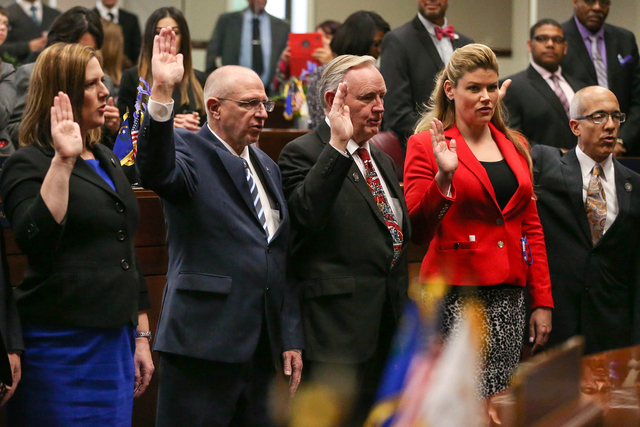Clark County gets another level of elected officials — rural town boards
Clark County will get another group of elected officials, but they will continue to do just what they do now: serving as volunteers on rural town advisory boards.
The Legislature has passed, and Gov. Brian Sandoval has approved, a bill that requires members of rural town advisory boards in the county to run for election if they want the unpaid job.
The law changes a system in which the board members have been appointed by county commissioners to meet monthly to hear local zoning and land use issues and make recommendations to the County Commission.
The change is a reminder that the county is geographically widespread with small rural communities far from the urban base of Las Vegas.
Under the law, town advisory board members must be elected if they are at least 25 miles from an incorporated city of 500,000 and in a county with 700,000 or more people. The law applies only to unincorporated towns at least 25 miles from the Las Vegas metropolitan area. They include Searchlight, Laughlin, Moapa, Bunkerville and Moapa Valley.
But it comes with a caveat: If there aren’t enough people running for office, commissioners still can appoint the board members. The county won’t have to have a separate election; the town board members will be elected in the next general election in 2016.
There probably won’t be a rush of small-town politicians vying for a chance to become an elected official in sleepy spots such as Searchlight and Moapa Valley.
Under the system of appointments, it’s already sometimes a challenge to find enough people willing to fill a five-member board, county and town officials say.
Some town officials criticize the change, saying it simply adds more requirements, such as filling out financial disclosures and campaign finance reports. The town boards will continue to be advisory; that doesn’t change.
On the other side is the argument that the residents in those rural towns should determine who serves on the boards instead of county officials in Las Vegas.
AUTHOR EXPLAINS BILL
State Sen. Joe Hardy, who sponsored Senate Bill 115, said it will “allow local people to elect local people who they like.”
The Boulder City Republican stressed that the law is “voluntary” and no one is forced to run. So if no one wants to run, those town board members “can be appointed just like they are now,” he said.
When asked about making people run for election for a position that is essentially advisory, he feigned outrage.
“Is that not a horrible thing?” he asked.
If they do run for office, Hardy said, it’s small-town campaigning of talking to neighbors — not a high-profile venture with billboards and newspaper advertising.
Yet, criticism remains strong.
Fred Doten, chairman of the Laughlin Town Advisory Board, said the change could affect how commissioners interact with town board members who get elected instead of picked by commissioners based on their qualifications.
“Now you’ve taken that away from the commissioners, so they’re going to get people they may not get along with and may not have any idea of their capabilities,” Doten said.
He also noted that the law’s provision that eliminates the ability of commissioners to remove town advisory board members would allow unengaged board members to remain in place.
“Once they’re elected, you can’t get rid of them,” he said.
County Commission Chairman Steve Sisolak said he didn’t support the change. He noted that the system sets up two types of advisory boards — elected and appointed. The county has urban town advisory boards with members who will be unable to run for election.
Yet, both town boards — urban and rural — will continue to do the same job of providing advisory recommendations.
“The problem is it’s still going to be an advisory board,” Sisolak said. “You’re going to have the same function, one being elected and one being appointed.”
Plus, it puts two elected bodies at odds with each other when the County Commission makes a final decision contrary to a recommendation.
“It’s going to be difficult when an elected board is going to be overruled, and that’s going to happen,” Sisolak said.
Bill Bodkin, chairman of the Searchlight Town Advisory Board, said the law simply will put more obstacles in the way — such as campaign filing requirements and more paperwork — for a volunteer position. The small town of about 539 people about 58 miles south of Las Vegas struggles to find enough people to serve on the board, he said.
“I think it’s going to be a bad deal for our little town,” Bodkin said.
His colleague, Searchlight Town Advisory Board member Sandra Walters, said she doesn’t know how the change will work out.
“Here, to get people to come out and do anything, it’s like pulling teeth,” she said.
PRIOR STRAW POLLS
Several years ago, towns had straw polls that allowed residents to voice their opinion about who should serve on the boards. But commissioners still had the final say.
That reached a boiling point in 2009. Sisolak, then in his first term, recommended four nominees for the Laughlin Town Advisory Board over the four who were chosen in a straw poll. That created an uproar among residents in the resort town of about 7,323 along the Colorado River.
Since then, the county has stopped using straw polls.
Sisolak said there were a lot of questions about how the straw polls were run, who oversaw the process and how many people voted.
Doten called the straw poll a “popularity contest.” In one instance, two people got picked in the poll despite one person losing interest and another one dying before the voting.
Back in 2009, there were cries of partisan politics. But one board member who was passed over after winning a straw poll at the time doesn’t see party politics in the process.
Kathy Ochs, a Laughlin Town Advisory Board member, was picked through a straw poll in 2008 and passed over in 2009 during Sisolak’s first term. She has since been appointed to the board.
Ochs said she is “still the same individual.” She said the county and Town Board work well together.
“He just did things his way, and that’s certainly understandable,” Ochs said of the 2009 situation.
Ochs is a registered Republican, while Sisolak is Democrat. Ochs said she isn’t aware of the party affiliations of her board members and said it’s not something they discuss.
Gene Houston, a town board member in Moapa Valley for about 20 years, said, “There’s pros and cons to both” ways of picking board members.
The town is a 60-mile drive northeast of Las Vegas.
The advantage of appointments is that people without high name recognition who are highly qualified can have a better shot at the board, Houston said.
Houston said the jobs — even for the advisory board members — can be tough, and even their nonbinding recommendations can be controversial in the small community.
“I don’t see an influx of people that want to get chewed out once in a while for their opinions,” he said.
Still, he said, it’s a good experience that everyone should volunteer for to serve their community.
Review-Journal Capital Bureau reporter Sandra Cherub contributed to this report. Contact Ben Botkin at bbotkin@reviewjournal.com or 702-405-9781. Find him on Twitter: @BenBotkin1.

RELATED STORIES
Nevada ‘tough-on-crime’ bills could force Jean prison to reopen
Reno Assemblyman Randy Kirner loses cop association support
NLV mayor backs bankruptcy power for cities, counties
Nevada Senate approves minimum wage increase bill
Nevada legislators urged to restart cloud seeding amid drought
Bill to boost maximum speed limit to 80 mph advances
See all of our coverage: 2015 Nevada Legislature.

















